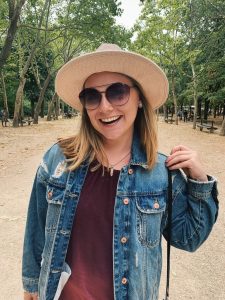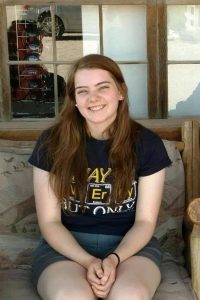While the pandemic certainly affects many aspects of Olivia Moens’s and Meredith Bone’s senior year at UW–Madison, their commitment to research remains as strong as ever.
As research assistants in the Social Kids Lab, psychology majors Olivia and Meredith are working to create and implement a parent-child intervention for reducing children’s racial biases. We caught up with them for this month’s Student Spotlight.

UWPsych: How did you get connected to the Social Kids lab?
Olivia: I first learned about the Social Kids Lab from a Psychology e-newsletter, so make sure you read them! I had no idea what I was getting myself into when I sent over my resume, but it is the best decision I have made in my undergraduate career so far.
Meredith: I was looking through a list of all the psych labs on campus and narrowed it down to my top choices. I was looking for developmental labs, in particular, because I wanted more experience with kids and had just taken Psych 460 (Child Development) and was intrigued by developmental psychology. I already knew that I enjoyed social psychology, and I figured the Social Kids Lab would give me the opportunity to explore both social and developmental psychology. I applied to the Social Kids Lab two semesters in a row because it was in my top three, but I didn’t get a position until the second time around.
UWPsych: Tell us about what you’re working on in the Social Kids Lab.

Meredith: It’s pretty apparent that we still have a pressing issue with racial inequities in our culture. Many parents choose not to have conversations about race with their kids because they don’t think that it’s important at that young age. However, kids understand and notice race and hold racial biases. We believe that intervening early in development can help reduce children’s racial biases before they’re deeply entrenched in adolescence and adulthood. Parents are highly influential agents in children’s lives, so it makes sense that parents should have an active role in reducing their children’s biases. We’re hoping to educate parents and provide them with strategies that will yield long-lasting results with young kids.
UWPsych: How has the pandemic affected your research?
Olivia: The pandemic has created a lot of obstacles and opportunities. We moved to completely running participants online which creates the opportunity to reach more families beyond the Madison area. Although there have been a lot of adjustments made to my project [and senior thesis], we have shown resilience and found a way to make it work.
UWPsych: How has your psychology major or involvement with Social Kids Lab shaped your plans for the future?
Olivia: Thanks to my involvement in the Social Kids Lab, I have gained a tremendous amount of experience and knowledge that has led me to my decision to apply to graduate school for school psychology. Without the amazing mentorship, I would have been lost with my post-graduate plans. I would recommend getting involved in a lab to everyone!
Meredith: I had a rough idea of what I wanted to do before I got involved in research. Now that I’ve had the chance to talk to some people with more experience in the field, I’m more confused about what to do because there are so many paths I could take. The only definitive choice that I’ve made so far is to take some time off between undergrad and graduate school, so I can have more time and experiences that will help me figure things out.
UWPsych: We’d love to hear what psychology fact or piece of trivia you’ll never forget. What’s one?
Olivia: Classical conditioning – I’ve learned it 8 times so there is no way I will ever forget it.
Meredith: Kids believe that people are more likely to grow up and change races than they are to grow up and speak a different language (Kinzler and Dautel, 2012)!
Know an undergraduate or graduate student who should be featured in our Student Spotlight? Nominate someone today.
October 6, 2020